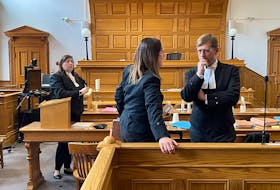Pinchas Gutter is alive today because the Nazis needed slaves to build bombs.
The Holocaust survivor was in Windsor Monday to tell young students the heroic and heartbreaking story of his life, and how he survived Nazi persecution that wiped out the rest of his immediate family.
“The Nazis decided to murder all the Jews in the Warsaw Ghetto,” said Gutter, 86, who wrote the memoir Memories In Focus. “Except at that time they needed slave labour, so they were sending you to camps where there were selections. There were gas chambers and there were selections. If they thought you were able to continue being a slave labourer for a little while, they chose you to die working. Their attitude was if we can’t kill you one way we’re going to kill you the other way. In the meantime, we can use you.”
Gutter was also the keynote speaker Sunday for the annual Yom Hashoah (Holocaust Remembrance Day) ceremony hosted by the Windsor Jewish Community Federation and Community Centre.
The conditions in the ghetto were an apocalyptic hell.
He made that speech a day after a gunman killed one person and injured three others at a California synagogue.
“I’m very much against guns, and I feel the proliferation of guns in the United States leads to that kind of thing, especially assault rifles,” he said in an interview Monday. “I was in the army. I know all about guns. I know what guns can do.”
“To me, this is something abhorrent. Hopefully, in Canada, we are going to try making stricter gun laws.”
On Monday, he visited students at Our Lady of Mount Carmel Catholic Elementary School.
“I tried to convey to them the ethos and the pathos of humanity in a way that they can understand by just speaking through my own experiences and my own feelings and emotions,” said Gutter. “I try to make them understand that the world is a place where there’s good and there’s bad, and it’s fighting inside you all the time. You have to try to make the good part of you vanquish the bad part of you.”
Gutter, born in Lodz, Poland, was eight years old when the Second World War broke out. After the Nazis occupied his hometown, his family was moved into the Warsaw Ghetto.
“The conditions in the ghetto were an apocalyptic hell,” said Gutter. “Schizophrenia, death, sickness, daily torture. You name it, that’s what happened. It was an apocalyptic hell that you cannot even describe. You can write about it and you can say exactly what happened, and many books have been written. But if you lived through it you lived like in a koszmar (nightmare). You got up in the morning and then anything could happen to you.”
After the Nazis beat down the 1943 Warsaw Ghetto Uprising, Gutter’s family was rounded up and sent to Majdanek extermination camp. His parents and twin sister were murdered there, leaving Gutter on his own at age 11.
He survived months of beatings and torture before being sent to a labour camp where he was forced to make bombs, mines and ammunition for the German army.
When the labour camp was evacuated near the end of the war, Gutter and the other prisoners were sent on a “death march” to Buchenwald concentration camp. He later ended up at a different labour camp before being forced on another death march to Theresienstadt concentration camp.
After the Red Army liberated him in 1945, he was sent to Britain. He later lived in France, Israel — he enlisted in the Israeli army in 1952 — Brazil and South Africa before coming to Canada in 1985. He now lives in Toronto.
Gutter said he tries to show the students he talks to that he was an “ordinary child” like them before the war. And like him, they can choose to be a force for good or bad in the world.
“I think they absorb it when they listen to a story, and that story stays behind,” he said.
“I can’t believe somewhere along the line a grain of it doesn’t appear. And that grain does grow. It’s dormant sometimes but eventually it sprouts and it does something to you. So I am very hopeful about the kids.”
Copyright Postmedia Network Inc., 2019








